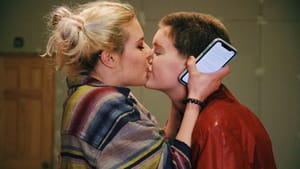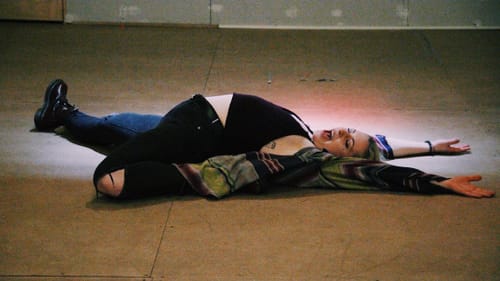Stay in the Loop
BSR publishes on a weekly schedule, with an email newsletter every Wednesday and Thursday morning. There’s no paywall, and subscribing is always free.
Perchance to dream
The Hum’n’Bards present ‘We’ll Sleep When We’re Dead’

I’ve been something of an insomniac since puberty. So a new Philly Theatre Week play from the Hum’n’Bards titled We’ll Sleep When We’re Dead caught my wakeful eye.
There are the nights that I can’t sleep because “The Ballad of Davy Crockett” is stuck in my head. The nights that I can’t sleep because I’m intimidated by the next day’s to-do list. Then there are also nights when I stay up till all hours for no good reason, get stressed that I’m not giving myself enough time to get a good night’s sleep, and then spend another hour with my brain in overdrive when I actually get in bed.
So, naturally, a play about a chip that can be implanted in the human brain to make it so that adults no longer need to sleep was fascinating to me. (It’s not that I don’t need sleep…but if there was a way to not need it, I’d be interested.)
Sleep no more
To be clear, We’ll Sleep When We’re Dead, the new collaboratively authored musical by the Hum’n’Bards, does not posit that such a chip — especially if compulsorily implanted — is a good thing. The reasons it was created, and eventually made mandatory, get a drily funny explanation in monologues by Dr. Dyler Heureux (CJ Higgins), a curator at the Philadelphia Museum of Sleep, on their YouTube channel.
This near-distant future sans sleep has given rise to an underground “sleepeasy” scene, where curious people can purchase drugs that will simulate the experience of dreaming. The general public, consistently unslept since adolescence, is awake but not awake, moving hazily through their days and using mattresses only as “sex beds” (a term that gets a lot of use in an entertaining and ferociously danced number performed by Macy Jae Davis, as Poppy). And, oh yeah, people who don’t get the chip installed by their 21st birthday can end up in jail.
So maybe not needing sleep isn’t all that it’s cracked up to be.
Sleep-crossed lovers
One of these sleepeasies is run by the Enchantress (a drag queen played by Taylor Plunkett-Clements), with the support of Lu (Monica Fischer), a 20-year-old who never got their chip and relies on the Enchantress for the uppers that let them keep pace with their non-sleeper counterparts. When Poppy arrives at the sleepeasy one day, she and Lu share an instant spark. Poppy quickly becomes hooked on dreaming — and on Lu. But because Lu is a “sleeper” and Poppy isn’t, it seems they’ll have to go to extreme lengths to be together. Lu seeks out Dr. Heureux for assistance, and everyone begins to understand the nature of the chip and how it will affect all of their lives.

They’re on point
Two of the characters in We’ll Sleep When We’re Dead, as well as one of the play’s performers, its director, and two members of the show band use they/them pronouns. The playbill notes all the characters’ and artists’ pronouns, but — she, he, or they — doesn’t dwell on the identification, and the script’s they/them pronouns roll off the tongue like it’s no big deal.
Because it’s not. It’s 2019. The singular they — already in use for literal centuries and something most of us use in casual conversation — is being widely adopted by media outlets and in educational and professional settings. Why shouldn’t more theater companies adopt the policy of the Hum’n’Bards playbill? Why shouldn’t more plays feature nonbinary characters and nontraditional relationships?
Wanted: Dystopia
For the many strengths of We’ll Sleep When We’re Dead — the show’s cast is terrific, the music is largely strong, and those YouTube “videos” are hilarious —something about the play, which was conceived for Philly Theatre Week, feels rough and unfinished at times. Some of the dialogue feels stilted or weak, and the resolution of the play felt unsatisfying, belying some of the promise of earlier scenes. I want my dystopian stories to end more dramatically. I don’t want ambiguity. I want the world to implode. Give me 1984. Give me Brave New World.
We’ll Sleep When We’re Dead is an interesting concept and an entertaining 90 minutes. I wouldn’t say it falls flat in the end, but a bit more development would be dreamy.
The show’s final performance is coming to Tracey’s Loft (2704 W. Girard Avenue, Philadelphia) on Saturday, February 16, at 8pm.
What, When, Where
We’ll Sleep When We’re Dead. By Macy Jae Davis, Monica Fischer, CJ Higgins, and Taylor Plunkett-Clements; Cori Maskart directed. Through February 16, 2019, at various Philadelphia locations. (267) 258-6325 or humnbards.com.
Sign up for our newsletter
All of the week's new articles, all in one place. Sign up for the free weekly BSR newsletters, and don't miss a conversation.

 Jillian Ashley Blair Ivey
Jillian Ashley Blair Ivey